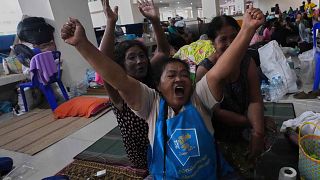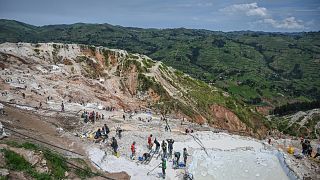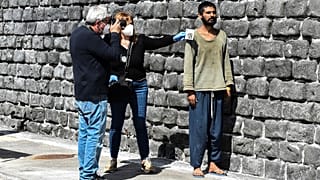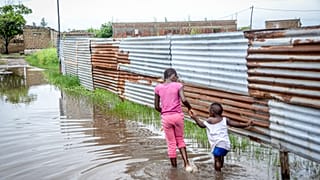Cambodia
Thailand and Cambodia have reached an agreement for an "immediate and unconditional" ceasefire starting at midnight to address the deadly border conflicts, announced Malaysian Prime Minister Anwar Ibrahim on Monday.
Anwar, who led the discussions as the head of the Association of Southeast Asian Nations regional bloc, stated that both parties have come to a mutual understanding to initiate steps towards restoring normalcy.
Cambodian Prime Minister Hun Manet and Thai Acting Prime Minister Phumtham Wechayachai have consented to an "immediate and unconditional ceasefire effective from... midnight of 28 July," Anwar declared while presenting a joint statement.
Hun Manet and Phumtham expressed satisfaction with the meeting's results and exchanged handshakes at the end of the brief press conference.
Ceasefire discussions commenced between the leaders of Thailand and Cambodia in Malaysia, in a pressing attempt to resolve the deadly border clashes that have persisted for five days despite increasing international appeals for peace.
Manet and Wechayachai convened on Monday at the official residence of Malaysian Prime Minister Anwar Ibrahim, who has been facilitating the negotiations as the chair of the regional bloc, the ASEAN.
The conflict escalated last Thursday following a land mine explosion along the border that injured five Thai soldiers.
Both nations have accused each other of instigating the clashes, which have resulted in at least 35 fatalities and displaced over 260,000 individuals from both sides.
Both countries have recalled their ambassadors, and Thailand has closed all border crossings with Cambodia, except for migrant Cambodian workers returning home.
Reports indicate that troops from both nations continued to engage in fighting on Monday in border regions.
Gunfire was audible as dawn broke in Samrong, located in Cambodia's Oddar Meanchey province, according to Associated Press journalists covering the situation.
Maly Socheata, a spokesperson for the Cambodian defense ministry, stated on Monday that the Thai assault was "ongoing and strong."
Anwar mentioned late Sunday that both parties would outline their conditions for peace, emphasizing that "what is crucial is an immediate ceasefire."
"I hope this can be effective," Anwar was quoted by the Malaysian national news agency Bernama. "While it’s not as severe as in many other nations, we must put an end to the violence."
This meeting came after direct pressure from U.S. President Donald Trump, who cautioned that the United States might halt trade agreements with either nation if the hostilities persist.
Before heading to Kuala Lumpur, Phumtham informed reporters in Bangkok that representatives from China and the U.S. would also be present as observers.
He indicated that the primary focus would be on achieving an immediate ceasefire, but acknowledged that trust could be a concern since Cambodia has not ceased its attacks.
"We have communicated that we lack trust in Cambodia. Their actions indicate a lack of sincerity in resolving this issue. Therefore, they must demonstrate how they will prove their sincerity," he stated.
Later, officials confirmed that the Chinese and American ambassadors to Malaysia are participating in the meeting.
This violence represents a rare case of open military conflict between ASEAN member states, a 10-nation regional group that has historically valued non-aggression, peaceful dialogue, and economic collaboration.
In a statement released on Monday, ASEAN foreign ministers expressed their concern regarding the increasing death toll, the destruction of public property, and the displacement of many individuals in the contested border regions.
They urged both nations to settle their disputes through dialogue and voiced support for efforts to reach a compromise during the discussions on Monday.
The conflict has also captured the attention of Pope Leo XIV.
During a statement at the Vatican on Sunday, the pontiff expressed his prayers for all those impacted by war globally, specifically mentioning “those affected by the clashes on the border between Thailand and Cambodia, particularly the children and displaced families.”
In an evacuation shelter located in Cambodia's Siem Reap province, far from the border, Ron Mao, 56, is praying for a ceasefire agreement as leaders meet on Monday.
She and her family fled their home, which is just a kilometer (0.6 miles) from the front line, when fighting erupted on Thursday.
They initially sought refuge in a shelter but later relocated to another camp further away after hearing the sounds of artillery fire.
“I don’t want to witness this war. It’s incredibly challenging, and I don’t want to be on the run like this,” she stated. “When I heard our Prime Minister was going to negotiate for peace, I would be overjoyed if they could finalize a deal quickly, so that my children and I can return home as soon as possible.”
Thai evacuees echoed her feelings.
“I implore the government. I want this to end swiftly,” said farmer Nakorn Jomkamsing at an evacuation camp in Surin, which is currently housing over 6,000 individuals. “I long for a peaceful life. I miss my home, my pets, my pigs, dogs, and chickens,” the 63-year-old woman expressed.
The 800-kilometer (500-mile) border between Thailand and Cambodia has been a point of contention for decades, although previous conflicts have been relatively short-lived.
The most recent tensions flared up in May when a Cambodian soldier was killed during a confrontation, leading to a diplomatic fallout and stirring unrest in Thailand’s domestic politics.











01:00
Another crane collapse near Bangkok raises safety concerns in Thailand
01:00
Crane falls on train in Thailand, killing at least 30 and injuring dozens more
01:00
Pix of the Day December 12, 2025
01:00
Chong Kal camp sees surge in displaced families amid Cambodia-Thailand conflict
01:00
Pix of the Day: December 11, 2025
01:00
Videos. Pix of the Day: December 10, 2025